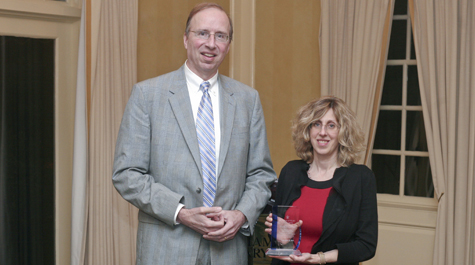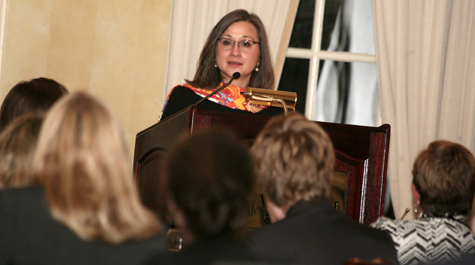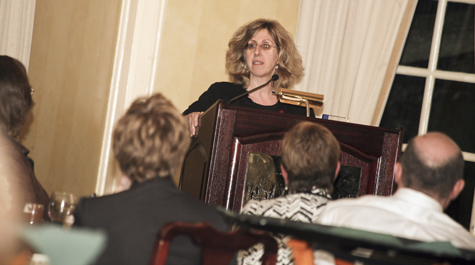Combs Appointed Goodrich Professor of Law at William & Mary
Colleagues of William & Mary Law Professor Nancy Combs have described her as “a superstar in international criminal law,” “inspirational,” and “ferociously talented.” Now they can add “Ernest W. Goodrich Professor of Law” to the honors.
The director of William & Mary Law School’s Human Security Law Center, Combs is an expert in human rights law, international criminal law, international law, post-conflict justice, and transitional justice. She has served as a member of the Amsterdam-based International Experts Framework, a working group that developed general rules and principles of international criminal procedure.
“Nancy has had a tremendous impact on the field of international criminal law through her two books, her many articles, her expert testimony, and talks and presentations around the world,” said Davison M. Douglas, Dean and Arthur B. Hanson Professor of Law. “Nancy has succeeded in all the ways we thought she would when we hired her.”
Combs was honored for her appointment as Goodrich Professor on Nov. 4 at a dinner in Leadership Hall of William & Mary’s Alumni House. Joining her were colleagues and friends who celebrated her many accomplishments and friendship.
“For me, the common thread running through all of Nancy’s contributions to the Law School is what I might call a ‘rigorous compassion,’” said Laura Heymann, Vice Dean of the Law School. “Her scholarship reflects a deep appreciation of the need to find effective ways to bring justice to victims of mass atrocities, coupled with targeted and insightful critiques.”
Heymann also praised Combs’ commitment to teaching. In evaluations, Heymann said, students referred to her enthusiasm as “contagious” and her approach to teaching as “engaging and brilliant.”
“Her teaching helps students hone their analytical skills without losing sight of humanity,” Heymann said. “And her service to the Law School, both formal and informal, responds to the needs of our community, but also ensures that things get done.”
A special guest at the dinner was Suzannah Linton, international consultant to the United Nations Development Programme and a visiting fellow at the British Institute of International and Comparative Law. A longtime friend and colleague, Linton worked with Combs on the International Experts Framework from 2008 to 2011, a collaboration that led to the Oxford University Press publication General Principles and Rules of International Criminal Procedure.
“The new Ernest W. Goodrich Professor of Law is a superstar in international criminal law,” Linton said. “She is widely regarded as one of the most original scholars in our area in terms of substance and in terms of the empirical methodology that she employs in her work. She tends to see the things that other people haven’t seen and chases them out. She’s at the head of the pack.”
Linton went on to highlight Combs’s groundbreaking books: Guilty Pleas in International Criminal Law: Constructing a Restorative Justice Approach (2007) and Factfinding Without Facts: The Uncertain Evidentiary Foundations of International Criminal Convictions (2010).
Both books, Linton said, changed the way people see things and do things in international law. The second book was “even more of a blockbuster than the first one,” she added. “It has been described as one of the most important books on international criminal justice ever written and a must-read.”
Combs holds a B.A., summa cum laude, in philosophy from the University of Portland, a J.D. from the University of California at Berkeley School of Law, a Ph.D. from Leiden University, and a certificate from the Hague Academy of International Law. At Berkeley, she was awarded the Thelen Marrin prize for graduating first in her class, and she served as an Articles Editor on the California Law Review. After law school, Combs served as a law clerk to Judge Diarmuid O’Scannlain on the U.S. Court of Appeals for the Ninth Circuit and to Justice Anthony Kennedy on the United States Supreme Court.
Prior to joining the William & Mary faculty in 2004, Combs served as legal advisor at the Iran-United States Claims Tribunal in The Hague, The Netherlands. Since joining the faculty, she has published numerous articles and essays in the University of Pennsylvania Law Review, the Vanderbilt Law Review, the Hastings Law Journal, the Harvard International Law Journal, the Yale Journal of International Law, and the Chicago Journal of International Law, among others.
Combs served the Law School as vice dean from 2011to 2013 and is a 2009 recipient of William & Mary’s Alumni Fellowship Award for teaching excellence and a Plumeri Award for Faculty Excellence.
The professorship bestowed upon Combs was created in 1999 in honor of Ernest W. Goodrich B.A. ’35, Hon. LL.D. ’02, who served William & Mary as rector, as a member of the Board of Directors of the Alumni Association, and as President of the Law School Association. The Surry County Commonwealth’s Attorney from 1939 until 1975, Goodrich lobbied to keep the Marshall-Wythe Law School running when it was threatened with closure in 1939.
As she thanked dinner guests for their well wishes, Combs recounted the arc of her career, from an original interest in constitutional law to becoming an expert in criminal and international law. She was especially grateful for the assistance she has received from colleagues.
“Virtually everyone here is pretty unfamiliar with the doctrines that I deal with and the cases that I deal with, but I still have received tremendous amounts of assistance on every piece that I have done,” she said. “The Law School has been incredibly good for me and good to me. We have very high standards here, but we also are provided a lot of support to help us reach our goals, and this chair is one manifestation of that.”
About William & Mary Law School
Thomas Jefferson founded William & Mary Law School in 1779 to train leaders for the new nation. Now in its third century, America's oldest law school continues its historic mission of educating citizen lawyers who are prepared both to lead and to serve.


